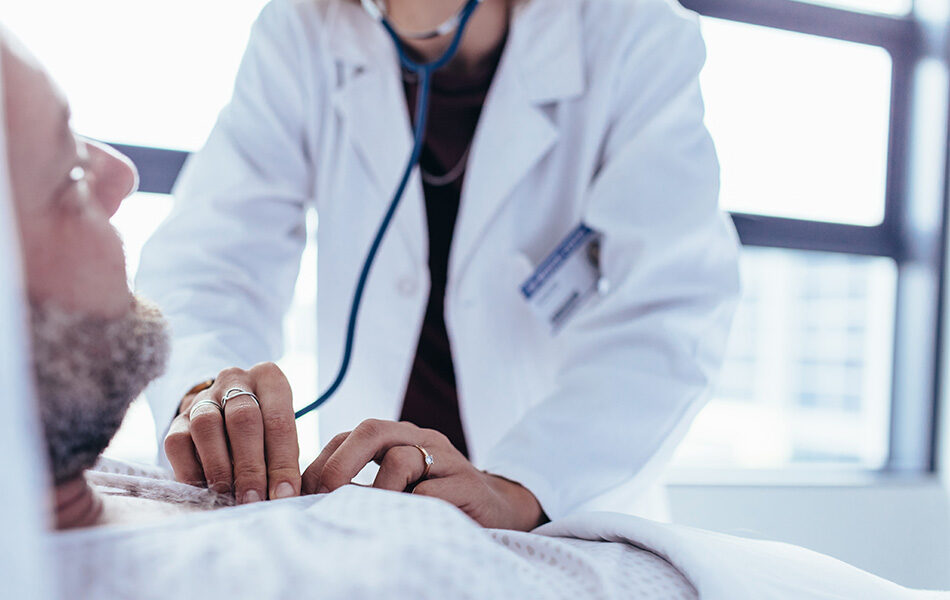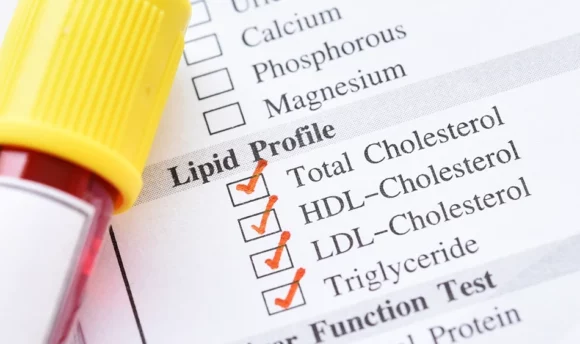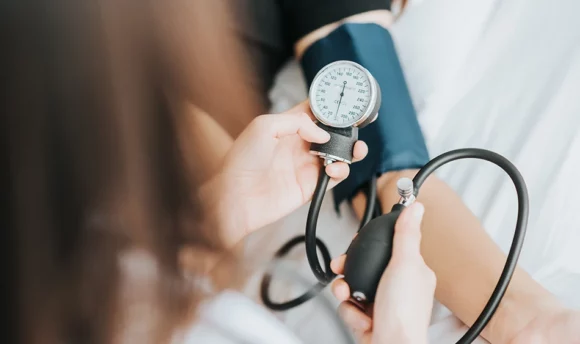When to Go to the Hospital for Rapid Heart Rate? 6 Warning Signs
A change in your heartbeat can indicate something is wrong. It’s important to understand the physical symptoms of a rapid heart rate and when you should seek professional help. Discover all the warning signs that encourage an urgent hospital visit.

The feeling that something is wrong with your heart can be scary. You might suffer from heart palpitations or a newfound chest pain that won’t go away.
A rapid heart rate could mean a lot of things, whether that’s because you’re running a fever or drinking too much caffeine throughout the day. Despite these common reasons, suffering from a fast heartbeat isn’t always good.
Keep reading to discover when you should go to the hospital for a rapid heart rate and tips for improving long-term heart health.
When to Go to the Hospital for Rapid Heart Rate?
An abnormal heart rhythm should never be ignored. Your heart will produce physical symptoms when something is wrong. Taking a trip to the emergency room can help you find answers to why you have a pounding heart.
Here are 6 signs that warrant a trip to the hospital for a rapid heart rate:
#1 Your heart is beating irregularly
A heart arrhythmia is an irregular heartbeat that doesn’t have a consistent rhythm. The beats can be too fast or too slow for some people.
While occasional heart palpitations are nothing to be concerned about, an irregular heart rhythm that doesn’t get treated may lead to complications. Atrial fibrillation is a common type of arrhythmia that might cause blood clots in the heart.
Some signs of an irregular heartbeat are fatigue, blood pressure spikes, shortness of breath, chronic anxiety, sweating, pounding in your chest, and fainting.
#2 You’re feeling chest pain
Chest pain can be caused by many factors. For some, being anxious triggers chest pain that eventually goes away with the right treatment. However, if your chest feels uncomfortable consistently, there might be another underlying reason.
An abnormal heart rhythm can put extra stress on your heart and chest muscles. The faster your heart beats, the more likely you’re breathing heavier. Because of this change, your lungs and chest muscles have to adapt quickly, leading to sudden discomfort.
Chest pain, along with heart palpitations, could be another sign of atrial fibrillation. Not seeing a professional about your rapid heart rate may increase the risk of a heart attack.
There is also a chance you could have angina – a type of chest pain that occurs when blood flow to your heart is reduced. It’s important to go to the hospital if your discomfort worsens or doesn’t settle.
#3 You have trouble breathing
People with heart conditions have trouble breathing properly every day. This is because their hearts cannot pump enough oxygen-rich blood to their lungs. Over time, pressure in the heart pushes fluid into air sacs, which makes it harder to breathe.
Shortness of breath is a common sign you have a rapid heart rate. An abnormal heart rhythm tends to affect both your heart and lungs at the same time.
Anyone who has trouble breathing should seek medical help right away. It may be an early warning for heart failure due to weakened blood flow.
#4 You experience loss of consciousness
Fainting spells can be a huge sign that something is wrong with your heart. You could have an arrhythmia, ventricular tachycardia, heart disease, or be experiencing a heart attack. These are serious conditions that require long-term treatment.
Those with undiagnosed heart disease may lose consciousness randomly. This is because their blood pressure is too low, meaning the heart cannot pump blood to the brain efficiently. A rapid heart rate tends to affect your blood pressure throughout the day.
Common symptoms of low blood pressure include nausea, confusion, muscle weakness, chronic fatigue, and dizziness. If you experience any of these, go to the hospital or arrange an urgent appointment.
#5 You’re feeling a strong headache
A fast heartbeat, along with heart palpitations and a headache, are usually signs of arrhythmia. Some people describe cardiac headaches as painful migraines due to the severe onset of pain.
One study found that ventricular fibrillation, a common type of arrhythmia, can cause dramatic spikes in blood pressure. This sudden change strains the nerves in your skull while stopping blood from entering the brain properly.
A hypertension headache might go away on its own, but the reason for your low or high blood pressure shouldn’t be ignored. Abnormal heart rhythms usually need emergency treatment when you go to the hospital.
Migraines can cause nausea, vomiting, and throbbing pain in your head. You might also be extremely sensitive to light and sound when in this state.
#6 You’ve lost your vision
Blurred or impaired vision is a scary symptom to experience alongside heart palpitations. Heart rhythm disturbances are usually to blame for this health problem. Retina vasculature, which is the arrangement of blood vessels behind your eye, cannot function without a healthy heart.
A sudden loss of vision means your heart hasn’t distributed blood efficiently throughout the body. Your eyes, brain, and stomach might not get enough oxygen-rich blood. In turn, you may experience intense migraines, cramps, and temporary blindness.
If you don’t seek emergency treatment, your eye damage can become permanent. It’s important to get comprehensive eye exams regularly to ensure everything is healthy. Doctors believe they can spot early signs of heart disease just by studying your eyes.
What Is Tachycardia?
Tachycardia is a term that refers to a heart rate of more than 100 beats a minute. A normal resting heart rate for adults should be 60 to 100 beats per minute. An irregular heart rhythm could indicate a serious medical problem. Common symptoms include chest pain, shortness of breath, rapid pulse rate, and heart palpitations.
Someone with tachycardia will have a rapid heartbeat even when they’re resting. Because their heart beats too much, it doesn’t have enough time to distribute blood properly. This can be dangerous if their cells and organs don’t receive adequate amounts of oxygenated blood.
Your heart has a sinoatrial (SA) node. It is a region in the upper chamber of the heart that sends electrical signals. These signals control how much your heart beats, especially when you’re suddenly anxious or scared.
Problems with this node can cause tachycardia because it struggles to send the right signals. If your heartbeat doesn’t calm down after resting, it may be a sign you have underlying heart problems.
Can tachycardia go away by itself?
A fast heart rate can sometimes correct itself once you’re well-rested. However, tachycardia might need treatment if it doesn’t calm down after a few days. It’s also important to seek urgent help after experiencing chest pain and fainting spells.
Sinus tachycardia, which is an increased heart rate due to stress or anxiety, may go away with time. This is common for people who have anxiety and high blood pressure. Living a healthy lifestyle, whether that’s exercising or meditating regularly, can help ease tachycardia symptoms.
On the other hand, supraventricular tachycardia is a sudden and erratic heartbeat, even when you’re not stressed. It can be scary for those who have no idea what’s going on. This type of heart rate may not subside quickly and can even trigger heart palpitations.
Just be aware that tachycardia doesn’t always go on its own. You might need medication or further examination to get to the root cause.
How Do I Measure My Heart Rate?
Place your pointer and middle fingers on your neck, making sure they are next to the windpipe. You should feel a pulse that determines your heart rate. Some people place two fingers on the inside of their wrist and count the number of beats for one minute.
To get an accurate reading, check your pulse more than once. Count how many times your heart beats in 15 seconds and multiply that by 4 to get your heart rate. It’s better to put your fingers on your neck since this pulse tends to be more prominent compared to the wrist.
There are also heart rate monitors you can get. They can tell you how fast your heart is beating, whether that’s from rest or exercise. Just make sure to buy a high-quality monitor that has gone through independent testing.
What Causes Rapid Heart Rate?
A rapid heart rate may come from emotional responses, stimulants, medication, exercise, dehydration, or heart damage. There are many reasons why you might experience tachycardia, so it’s important to measure your heart’s rhythm and how it fluctuates.
The most common cause of a fast heartbeat is mental stress. Feeling anxious puts your body into a fight-or-flight response, which gets the heart pumping faster to keep your brain focused. Managing your emotional stress can prevent anxiety attacks and heart palpitations.
Putting things into your system, like caffeine and nicotine, can cause a rapid heart rate. Caffeine especially promotes an irregular heartbeat. This is because beverages like coffee and tea encourage the release of noradrenaline and norepinephrine – two stimulating hormones.
These hormones increase heart rate and blood pressure. It’s the same with alcoholic drinks and how they encourage your heart to pump blood quickly. Plus, alcohol dehydrates you, which decreases your total blood volume.
Some people might have hidden heart problems. Eating too much processed food or not getting enough exercise increases the risk of cardiovascular disease.
How Can I Prevent My Heart From Beating Fast?
Maintaining a normal rhythm requires regular exercise, relaxation techniques, healthy food consumption, and a high water intake. You need to make these lifestyle changes if you want to protect your heart and prevent conditions like tachycardia and hypertension.
A study found that those who exercise for 30 minutes daily have a lesser risk of developing heart disease. Your heart will beat fast during exercise, but that’s a good thing. Going out for a simple walk or run in the morning improves blood circulation and lowers heart rate over time.
You can even try meditation to calm your heart. Certain mental health apps have meditative features that focus on correcting your breathing and thoughts. At the same time, cognitive behavioral therapy (CBT) has been proven to reduce emotional stress.
Eating healthy food and drinking plenty of water also helps. Post-meal heart palpitations often come from processed meals and sugary beverages. Instead, focus on consuming nutritious foods that fuel your body.
FAQs
You shouldn’t have tachycardia symptoms for longer than 30 minutes, depending on your current health. This is a sign you need to go to the emergency room for urgent testing. Leaving tachycardia untreated might lead to heart failure, stroke, and even sudden cardiac death.
Doctors can test your heart using an ECG. This is a painless test that records the electric signals of your heart rhythm to identify any problems. Then, they might prescribe medication to control your heart rate or go through surgery options if your heart rate is currently life-threatening.
Tachycardia can be an urgent condition if you have chest pain, lightheadedness, muscle weakness, and chronic fatigue. You should always seek medical help quickly if you feel like fainting or the irregular heart rhythms become more abnormal and painful with time.
A Word From a Cardiologist
A sudden change in your heart rate can feel scary. The racing heart and panicked breathing state could make physical symptoms worse. However, if this is caused by emotional stress or caffeine, your heart should settle down.
For those who have heart palpitations regularly, atrial flutter might be the reason. Atrial flutter is another type of abnormal heart rhythm. It can feel like your heart is fluttering or missing a few beats. A doctor can diagnose this condition and prescribe medications to regulate your heartbeat.
Remember that symptoms like chest pain, fainting, blurred vision, migraines, and shortness of breath could indicate a serious underlying condition. Always seek urgent help if you feel like something isn’t right with your heart.
Conclusion
A fast heart rate accompanied by chest pain, headache, fainting, and vision loss means you should go to the emergency room. These signs indicate that you have a problem with your sinoatrial node, which prevents electrical signals from controlling your heartbeat properly.
If you want to maintain a normal heartbeat, exercise for at least 30 minutes every day, follow a healthy diet, and manage your stress levels.

















































 Select your language:
Select your language: 








